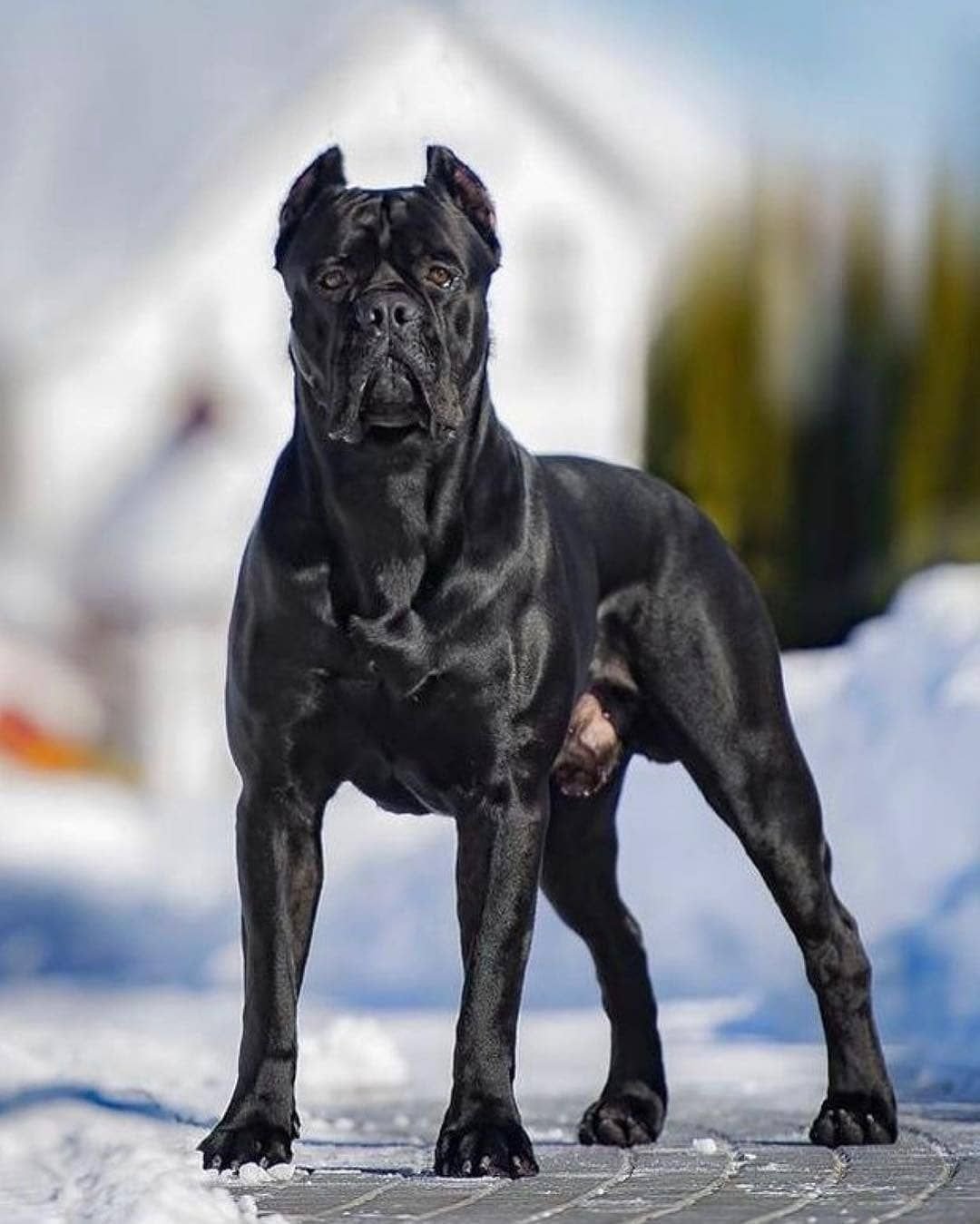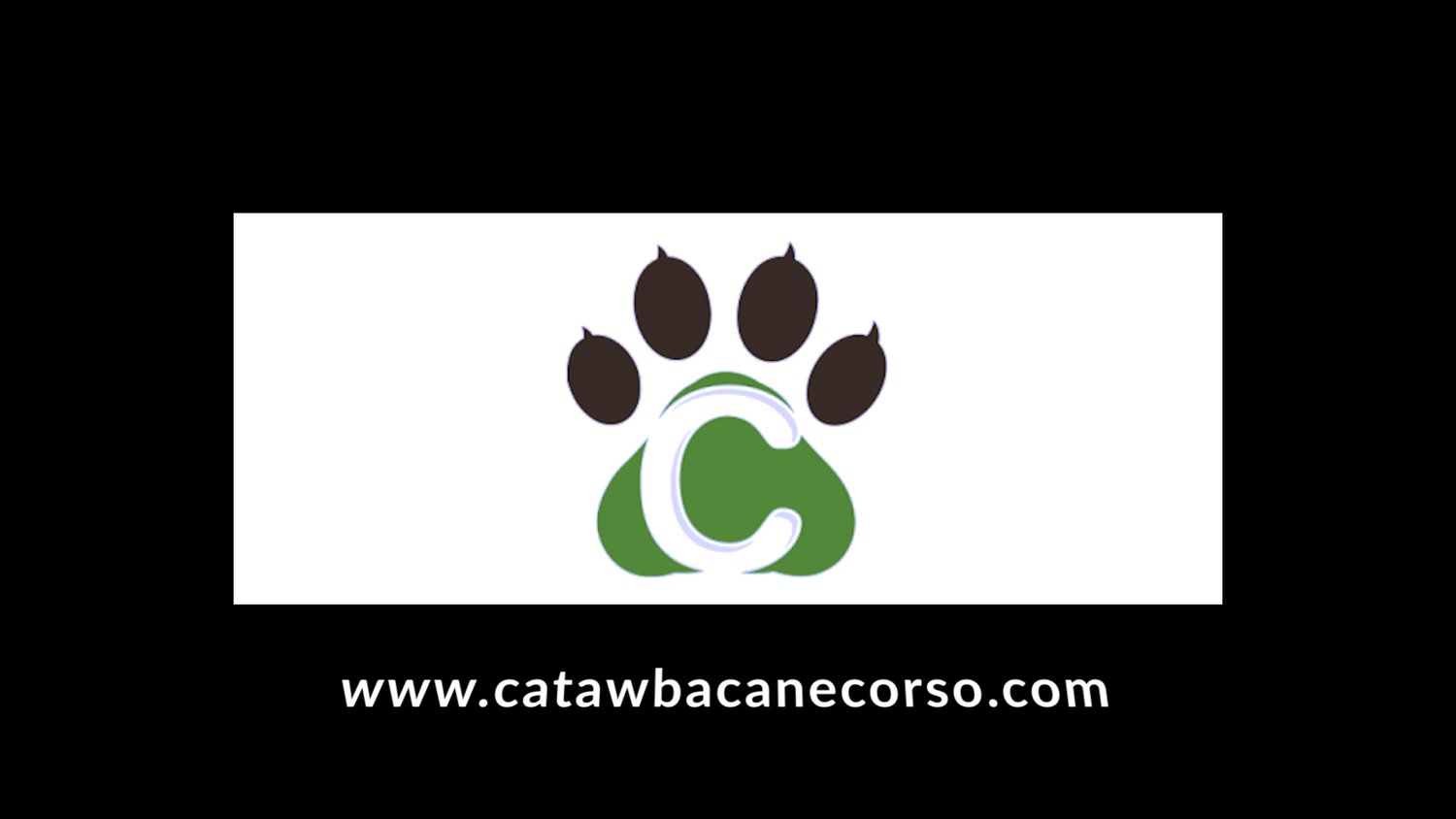
Frequently Asked Questions


Where does the breed come from, and what were they used for?
The Cane Corso, along with other mastiffs such as the Bullmastiff, Old English Mastiff, Neapolitan Mastiff, etc. are descended from a very old class of dogs known as Molossans or Molossers.
It is thought that ancient Greek Molossan tribes were the first to breed massive dogs for guarding, for war, and for fighting other animals "for sport." Because invasions and conquests were so common, these huge dogs became dispersed throughout Europe and crossed with native breeds to form a mastiff variety specific to that particular area.
For example, the Cane Corso is a product of molossan dogs crossed with native Italian dogs. When the Roman Empire fell, the Cane Corso was shifted from war dogto hunting wild boar, driving unruly cattle, and guarding family farms.
What traits would help Cane Corsos accomplish their work? That's right... high energy, strong instincts to pursue and confront other animals that run, high tolerance for pain, athleticism, courage, toughness, determination, independent thinking but also trainability, and loyalty to his owner.
Many of the ancestral Molossan traits that resulted in a formidable war dog are still in the DNA of modern Cane Corsos. But much (not all) of the ferocity has been bred out.
How big are Cane Corsos? Height and weight?
Size is controversial. There are multiple Cane Corso clubs and registries, both here and abroad, and they often recommend different heights and especially different weights.
In general, males are about 24-28 inches at the shoulder, while females are about 23-26 inches.
According to the various clubs and registries, weight should range from 90-110 lbs for males, and 85-100 lbs for females. But I've worked with a number of Cane Corsos who were well over those weights.
American breeders are especially prone to increasing weight to 130 or 140 lbs, to the detriment of the dog's joints, working abilities, and overall health.
It's safe to say that most Cane Corsos are easily in the GIANT category.
Do Cane Corsos need a fenced yard?
Yes, with a high solid fence. See-through fences, unless you live in a really private area, encourage barking and aggression. See-through fences also allow strangers of the dognapping persusasion to see what a potentially valuable breed you have.
Are Cane Corsos easy to train?
Yes and no. If you are an assertive person who can "read" and respond to a strong-willed working dog and establish a healthy leader-follower relationship, a Cane Corso will be very willing to work with you.
On the other hand, if you're more of a mild-mannered, peaceful, live-and-let-live kind of person... don't get a Cane Corso. He will run the household and you're likely to see increasing aggression issues going forward, which puts other people and animals at risk. This breed is a terrible choice for passive folks.
Are Cane Corsos easy to housebreak?
As with any training, it takes consistency and patience. Once your Cane Corso learns to go outside to do it’s business, they're fine.
Are Cane Corsos friendly with people?
With their own family, Cane Corsos are affectionate and devoted.
Toward strangers... some Cane Corsos are friendly, but most are standoffish/aloof. Cane Corsos from working/performance lines often have tougher temperaments toward strangers.
Most (but definitely not all) Cane Corsos have protective instincts. Unfortunately, without actual protection training, they are not effective protectors. But they can still be excellent deterrents... as long as you stay in charge and immediately stop any unwarranted aggression.
For both ethical and legal reasons, you should require your Cane Corso to be polite (i.e. well-mannered, non-aggressive) with everyone who is not a bad guy. For example, it's okay if the dog doesn't (for whatever reason) like one of your friends or neighbors. But he must not act on those feelings with barking or threatening behaviors. Instead, he must behavepolitely.
One of the problems with excessive aggression is that you can't always tell whether it's coming from an attitude of true aggression... or from fear. I've worked with two Cane Corsos who were "fear biters." They were skittish or fearful around strangers or in unfamiliar settings. Unfortunately these temperament flaws are serious, as they make the dog's behavior unpredictable when triggered and can lead to defensivebiting.
Are Cane Corsos good with children?
Most individuals s are patient with children, yes. But I don't recommend Cane Corsos for children younger than about 10 years old. This powerful, vigorous breed could accidentally knock over a small child.
And let's not just sweep under the rug the reality that aggression is hardwired into the DNA of these powerful mastiff breeds. It's the reason they were created. If your kids are roughhousing or have a heated dispute with their friends, a Cane Corso can't be expected to know whether it's harmless or not. Dogs are wonderful creatures, but they can't read minds.
Are Cane Corsos good with other dogs?
If you're a strong leader, a Cane Corso will usually be fine with other dogs in their own family – but I would make sure the other dogs are the opposite sex. Cane Corsos can be very dominant and pushy toward other dogs of the same sex.
Also, because of the strong prey drive of some Cane Corsos, it's a risk to keep those individuals around very small dogs who might run.
Personally, I prefer to see this breed kept as an only dog.
Where can I adopt an older Cane Corso ?
I am a strong advocate of adopting dogs from Rescue groups. But with this breed, I personally wouldn't do that. I would too concerned about the dog having inherited unstable genes.
Adopting from the pound or animal shelter is even riskier, as you have no idea what that dog might turn out to be like, and the consequences of making a mistake concern me too much. Some shelters won't even offer mastiff breeds for adoption because of concerns about legal liability.
Rescue groups have at least been fostering their Cane Corsos in normal homes, so they have a better idea what the dog might be like in a family setting. Still too risky for my taste, but you might be willing to do it.
What Red Flags should I look for when buying a puppy ?
Great question ! With such accessibility online, it can be like the Wild Wild West when buying anything on the internet.
Best answer , do your diligence to research the potential seller and be instinctive. If your gut say’s move on, you might should listen.
Here’s a helpful article to check out that addresses that very question.
RED FLAGS WHEN BUYING A PUPPY
“Reading is RUFF for a puppy”
Overview
The Cane Corso breed is a robust and athletic dog with a long history. This elegant canine is a descendant of the now-extinct Roman Molossus. Their name roughly translates to “bodyguard” in Latin, so it’s no wonder that these fearsome dogs have been used as guardians throughout the ages.
Temperament
Cane Corso puppies are a confident, even intimidating, demeanor. Their size and temperament translate into elegant strength, making them treasured guard dogs and companions.
The Cane Corso is intelligent, loyal, and protective. These smart dogs respond well to consistent, reliable leadership and need their master to be the leader of the pack. Once they fully bond with their master/pack leader, they are loyal, affectionate, and exceptionally eager to please. This combination makes them easy to train.
While they are large and sometimes fierce with strangers, these pups are gentle and loving with people they know and usually do well with children.
Because of their suspicious nature and physical strength, careful training and socialization are necessary to curb aggressive behavior.
Health
The Cane Corso breed’s average life expectancy is 10-12 years. Like with many large breeds, watch for signs of Hip Dysplasia in older dogs. While this dog is usually healthy and vigorous, watch for these health issues:
Elbow Dysplasia
Orthopedic Problems – Panosteitis, Osteochondritis, Luxating Patella, Cruciate Ligament Rupture, And Wobbler’s Syndrome
Heart Disease
Cancer
Eye Disease
Hypothyroidism
Skin Disease
Like all relatives of the Mastiff, these deep-chested pups are susceptible to Bloat, a sudden and life-threatening stomach condition. Make sure you talk to your vet about the best ways to protect against Bloat. This large, athletic breed also needs lots of daily exercise to keep them healthy, calm, and centered.
Owners should keep their Cani Corsi vaccinated and bring their pups in for regular checkups with their veterinarians.
Coat & Coat Care
The short coat of the Cane Corso breed is a bit deceiving since it also includes an undercoat. This unique coat keeps them warm in the winter and cool in the summer.
During shedding season, a Cane Corse should have brushing increased to daily. Wipe your Cane Corso’s ears with a clean, damp cloth every week and wipe down wrinkles to prevent skin infections. Avoid bathing to preserve the coat’s natural oils.


